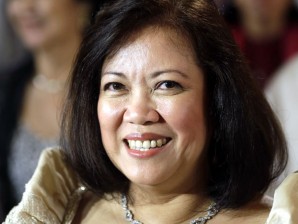SC row: Justices revoke Sereno order
Supreme Court justices on Tuesday confronted Chief Justice Ma. Lourdes Sereno on her order to reopen a regional constitutional administrative office (RCAO) without their consent but agreed to create a committee that would study the move intended to decentralize supervision over lower courts.
A court insider told the Philippine Daily Inquirer that the resolution creating the committee to be led by Associate Justice Jose Portugal Perez would “supersede” Sereno’s controversial order.
“By making this resolution, everything will be put on hold,” the source said, referring specifically to Sereno’s appointment of Geraldine Faith Econg, the court’s head of the program management office, as head of RCAO-7 in Cebu City.
The source said that Econg would be named member of the committee.
Tuesday’s en banc session was the last for the Supreme Court before it goes on its Christmas break beginning today until Jan. 9.
Sereno got the ire of the justices when she issued Administrative Order No. 175-2012 on Nov. 27 that created the Judicial Decentralization Office and reopened the post of RCAO-7 Associate Justice without getting the approval of the Supreme Court en banc.
She appointed Econg to head RCAO-7 and had gone to Cebu City on Nov. 29 for the reopening of the office.
No consensus
On Dec. 3, Associate Justice Teresita de Castro wrote Sereno and the justices asking the Chief Justice to recall or amend her order because it “did not reflect the court’s deliberations and the consensus of the justices opposing the reopening of RCAO-7” in its en banc session on Nov. 27.
Among other things, De Castro said Sereno’s order usurped the justices’ duty to administer all the courts and their personnel, and also undermined the Office of the Court Administrator (OCA).
The court’s public information office issued a statement on yesterday’s en banc meeting, but was silent on what happened to Sereno’s order.
It stated that Sereno presided over the en banc session and that she included in the agenda “the decentralization of the Court’s administrative functions with respect to the lower courts, in order to include all inputs.”
“The members of the Court are of one mind on the merits of decentralization, and have agreed on measures to ensure its effective and deliberate implementation, including the creation of a committee headed by Associate Justice Jose Portugal Perez to conduct a needs assessment of decentralization,” the statement said.
Asked what happened to Sereno’s order, court spokesperson Gleo Guerra told the Inquirer “to just go by what is stated in the resolution” that was yet to be released.
Resolution supersedes order
The Inquirer source said the en banc had agreed that the resolution would include a statement that it “supersedes all previous resolutions,” referring to Sereno’s order.
“The compromise was not to make it appear they are revoking the resolution,” said the Inquirer source, who requested anonymity for lack of authority to speak on the subject.
But the source said the implication of the new resolution was that Sereno’s order had been set aside temporarily because of Econg’s designation as a member of the study committee.
The source also made it clear that the merits of decentralization was not the issue here because all justices, even before the ouster of Chief Justice Renato Corona, agreed on the idea.
“The justices just opposed the manner by which the Chief Justice appointed a person to a technically nonexistent office,” the source said. “The Chief Justice circumvented the procedure.”
The source said that the late dictator Ferdinand Marcos had issued a presidential decree that allowed the Chief Justice to create subunits of the OCA and later another presidential decree authorized the en banc to create these subunits.
During the discussions, Sereno’s backers defended the order, saying the court had created the RCAO when it previously made a pilot test in Cebu City.
On the other hand, De Castro had been insistent on the revocation of the Sereno order, the source said.
Call for unity
In her Christmas message to court employees during an interfaith service on Monday Sereno said she was fervently praying for “true unity, not only this Christmas, but also in the coming years.”
“Everything I do is based on the belief that all of us will have to render an accounting of what we have done in this life. My responsibility is to be your servant leader. I will do what I need to do in order to serve,” she said.
But the same source said the justices were surprised when Sereno ordered a stop to the Christmas fair that was being held in the court grounds while the interfaith service was going on.
Even before she was appointed the new Chief Justice, Sereno had not been popular with her colleagues. She had earned their ire when she revealed internal deliberations in the high court in her dissenting opinions to issues like the issuance of an order allowing former President Gloria Macapagal-Arroyo to leave the country for medical treatment.
Her assumption to the top post in the Supreme Court, which Sereno will hold for 18 years, also did not earn any admiration from her colleagues because she bypassed many of them who are more senior.
